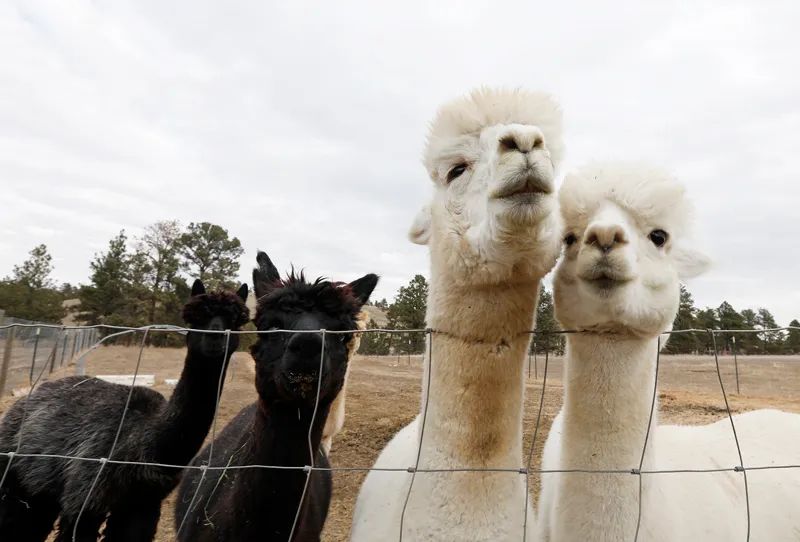
Home on the Range with Alpacas
Angi Lyngby-Cox loves the calm and curiosity of this social herd
Just west of Billings sits the Mule Train Alpaca Ranch (MT Alpaca Ranch), where alpacas roam and an occasional antelope and deer may play. Home on the 20-acre range are owners Angi and Udo Lyngby-Cox, who raise alpacas — slender-bodied animals with long necks and legs, small heads and pointed ears. These adorable creatures have fleece that is made into luxuriously soft, warm garments and blankets. The couple breeds the animals to continually improve the conformation and fiber characteristics of this creature’s much-sought-after fleece.
Calm and curiosity reign at MT Alpaca Ranch with the two breeds of Suri and Huacaya alpacas. The Huacaya fleece resembles that of a teddy bear while the Suri fleece looks like “dreadlocks.” Angi says of her raising and being with her alpacas, “This is a quiet place. A place of serenity and reflection when I’m with them.”
The ranch is in Molt, a rural community 17 miles outside Billings with rolling grasslands dotted with pine trees. A visitor can reach the property from the paved Buffalo Trail, which turns to gravel before eventually winding down a driveway onto Mule Train Road. At the gate, Udo and Angi, along with their Great Pyrennees, Duke, greet a guest. This dog, the size of a sheep, wears a thick, gently matted white-colored coat that appears as though it could also be spun into yarn.
Aside from being the greeter, Duke’s job is to guard the alpaca herd, manifesting his genetics as a working dog, deterring invaders such as wolves and other predators on snowy mountaintops. Although he can spring into action when needed he, too, is calm and curious.
After relocating to Montana from an 18-year stint in Germany, Angi acquired a spinning wheel that inspired her to join the local spinning guild. At one of the first meetings, the group asked if anyone was interested in purchasing a small herd of alpacas.
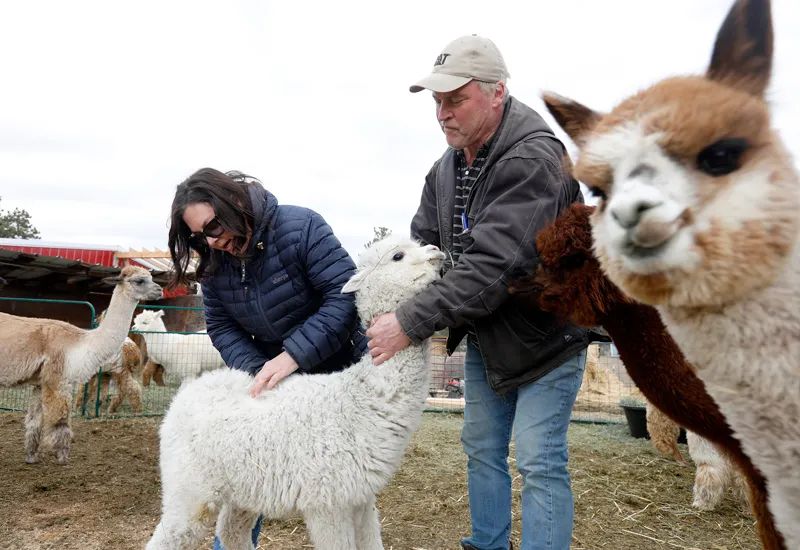
“I had no clue about raising alpacas,” she says. “I started researching.” She discovered that alpacas needed less space. They are easier to handle.” Alpacas have padded feet and are gentler on pastures, and they are mostly quiet as they communicate by humming. They do not eat pasture grasses completely down and their dung is less odiferous.
Angi originally travelled to Germany to work as an au pair, then later attended Bielefeld University, where she met Udo. After the two completed their studies, Angi worked as a case manager for a mental health rehabilitation clinic while Udo helped young adults with epilepsy reintegrate back into society. Their skills of nurturing and caring for people carried forth into their current pursuits.
In 2016, the couple acquired one llama and 13 alpacas. The llama, larger in stature, with its elongated face and banana-shaped ears, looked after the herd of their Camelidae family members that were smaller in size with blunt faces and shaggier fleece. These days, the MT Alpaca Ranch is home to 94 alpacas and three llamas.
“They all have distinct personalities and I enjoy getting to know them,” Angi says of her alpacas. Udo’s favorite alpaca is named Bonjour, meaning “Good day” in French. “When we first got him, he tried to challenge me. I had to show him that he was not the boss. From that point on, has been the first behind me ever since,” Udo says.
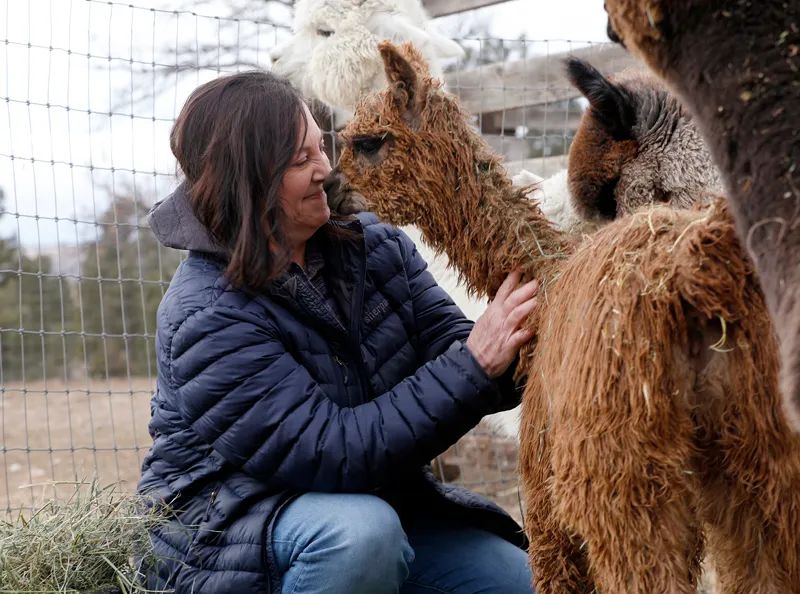
Angi often travels to Texas, Missouri, California and Wyoming to show her alpacas, finding joy in the breeding process and sharing her animals with others.
“I love the camaraderie.,” she says. “I love being with alpaca people. I love seeing what the industry is doing. I get ideas on what to do with the herds.” Mostly, Angi relishes the friendships she has made. These relationships have brought together alpacas for compatible unions. “I can send somebody a herd sire,” she says, or she can receive a sire for her animals.
At MT Alpaca Ranch, Moe, with a white face and grey fleece, stands tall with the posture of a ballerina in the pasture among the other males and is one of the stars in the herd.
“We breed and show for different purposes, for fiber or lawn ornaments,” Angi says. Alpaca fleece has 22 natural colors ranging from white to black, and rose gray to silver gray to beige, fawn, and brown to champagne.
Angi and Udo work as a team. Udo routinely does the morning feeding, checks on the herd’s health and cleans the pastures when he is not out of town selling heavy equipment for road construction, for his business Walk n’ Roll. Angi does the marketing and travels to the shows. During the warm months, they offer prescheduled tours.
Angi, playfully pronouncing Udo as “You do,” says she often has a “Udo list.” For his part, Udo says of Angi, “She’s the energy and motivation, always taking on new challenges,” but she admits, “He went along with it, and I couldn’t have done it without him.”
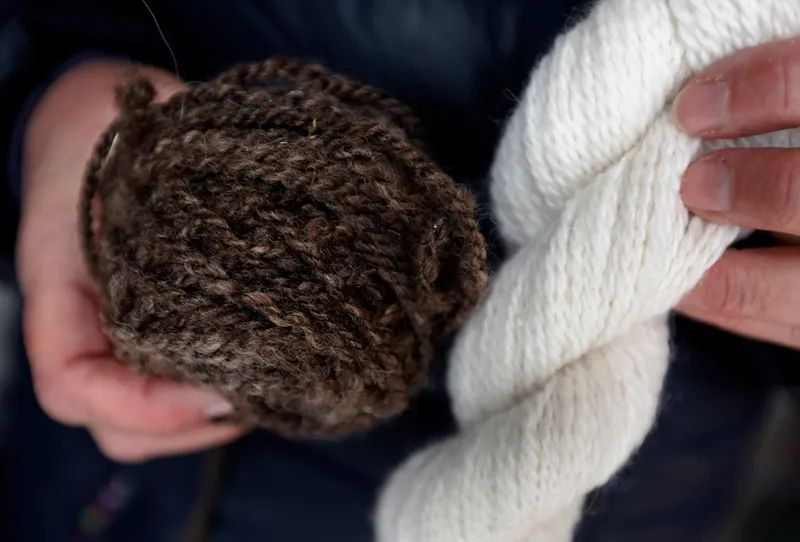
Her understanding and love of agriculture came from her childhood on a dairy farm in Brandon, South Dakota. Udo grew up on a farm with cattle in Brekerfeld, Germany. He says with a laugh, “I didn’t like doing the work for my family. I did not want to put up fences and buildings. Now look at what I am doing.” On the ranch, fences require regular attention to ensure the animals’ security, while additions and repairs are constantly being made to the many buildings on the property.
With the closest alpaca veterinarian in Denver, Angi finds she and Udo “do as much ourselves as we can. It’s hard to get a vet out here. We have been blessed to not any problems.” When she knows an alpaca is pregnant, she says, “I have to stay home when they have their babies.” Since the male and female alpacas are brought together to mate Angi, knows the approximate date of birth after the 11-month gestation period.
Angi calmly focuses on the goings-on of her menagerie of animals, which are housed in the numerous pastures and enclosures. The female and male alpacas of breeding age are kept in separate spaces, while the youngsters remain together in another area. There is also a miniature horse, isolated from the larger horses that have been picking on him, three merino sheep named Matilda, Popcorn and Luisa, and a handful of black-faced sheep in their own pasture. Some chickens have their place near the barn.
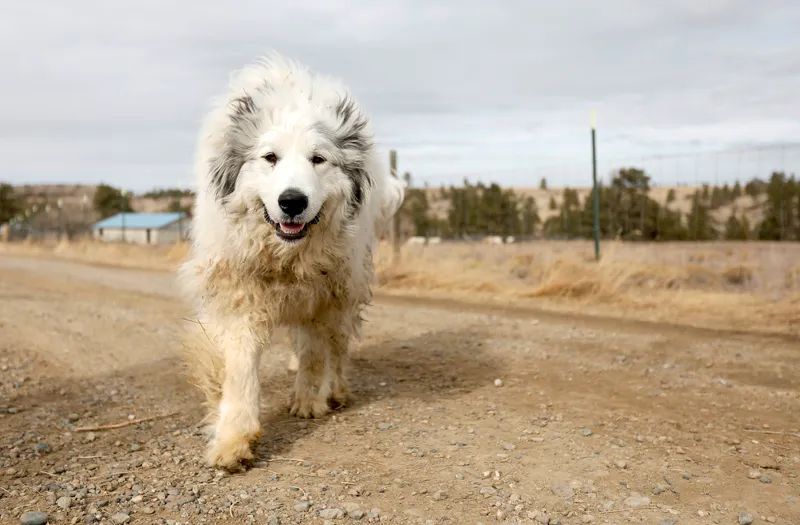
The alpacas are relentlessly inquisitive, especially in the enclosure with the young ones. Many follow Angi and Udo around, occasionally sneaking in a nuzzle. Others slip away upon approach, yet they watch every move their human caretakers make.
Home on this range at the MT Alpaca Ranch, Angi and Udo Lyngby-Cox have created a place for alpacas to roam where there is not a discouraging word.
MULE TRAIN ALPACA RANCH hosts tours and even sells yarn and goods made from alpaca fleece. To learn more, visit mtalpacas.com











